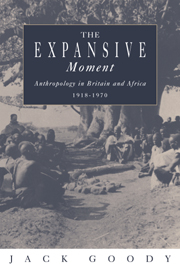Book contents
- Frontmatter
- Contents
- Introduction
- 1 The economic and organisational basis of British social anthropology in its formative period, 1930–1939: social reform in the colonies
- 2 Training for the field: the sorcerer's apprentices
- 3 Making it to the field as a Jew and a Red
- 4 Personal and intellectual friendships: Fortes and Evans-Pritchard
- 5 Personal and intellectual animosities: Evans-Pritchard, Malinowski and others
- 6 The Oxford Group
- 7 Some achievements of anthropology in Africa
- 8 Personal contributions
- 9 Concluding remarks
- Appendix 1 Changing research schemes
- Appendix 2 Towards the study of the history of social anthropology
- Notes
- List of references
- Index
Appendix 2 - Towards the study of the history of social anthropology
Published online by Cambridge University Press: 30 September 2009
- Frontmatter
- Contents
- Introduction
- 1 The economic and organisational basis of British social anthropology in its formative period, 1930–1939: social reform in the colonies
- 2 Training for the field: the sorcerer's apprentices
- 3 Making it to the field as a Jew and a Red
- 4 Personal and intellectual friendships: Fortes and Evans-Pritchard
- 5 Personal and intellectual animosities: Evans-Pritchard, Malinowski and others
- 6 The Oxford Group
- 7 Some achievements of anthropology in Africa
- 8 Personal contributions
- 9 Concluding remarks
- Appendix 1 Changing research schemes
- Appendix 2 Towards the study of the history of social anthropology
- Notes
- List of references
- Index
Summary
Writing about the recent history of social anthropology in Britain has made me think more tightly about the writing of history, especially when I compare my own approach with that of individuals who were neither anthropologists nor participants. Participants do not make the best historians, nor do practitioners make the best historians of science. But historians too are at a disadvantage. In the first place they are dependent on the written record or, with contemporary or oral historians, on recollections about the past. As we have seen in the case of the letters of Evans-Pritchard and Malinowski, the written record is very partial in a number of ways. Not simply because much is left out, much destroyed, but because the presentation of the self in writing is often a caricature of what occurs in the intercourse of everyday life. Obviously the written record of an incident covers a greater span than the understanding of any one of the participants, perhaps of all of them. But in so far as it does so it may well override subjective meaning, meaning to the actors. Of course, the presentation of such a meaning can rarely constitute the be-all and end-all of scholarship. Equally it can never be disregarded.
Of nowhere is this more apparent than in intellectual history. Historians of this domain are intent on placing people in schools, to which various characteristics are allotted. This is done partly for their own understanding of a complex situation, partly to make comprehension easier for the reader, who likes to have his phenomena tied together in neat packages.
- Type
- Chapter
- Information
- The Expansive MomentThe rise of Social Anthropology in Britain and Africa 1918–1970, pp. 191 - 208Publisher: Cambridge University PressPrint publication year: 1995



